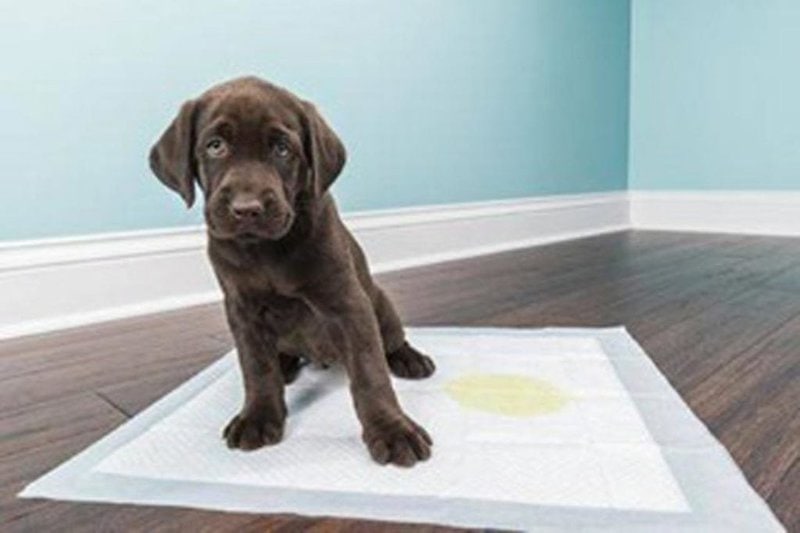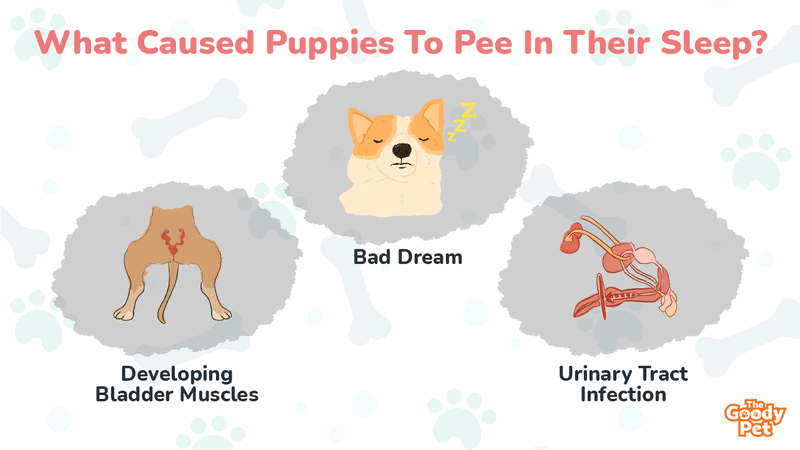Congratulations on bringing home a cute little bundle of joy in the form of a four-legged baby. You have to understand that although your new fur baby is a ‘work in progress,’ it may still pee and poop anywhere in your home. For as long as your puppy is not yet potty trained, you should expect a lot of mess in your home, but of course, that is just temporary.
On average, puppies younger than six months of age pee at the rate of once every 1 to 2 hours, while older puppies pee every 2 to 6 hours. Housebreaking a puppy is widely deemed to be the most important and the first step in training. Along the way, there’d be accidents, but what is considered normal during the potty training process? Do puppies pee in their sleep? If this happens frequently, is that normal, or is there a reason to worry?
This time, you’d be learning about the normal peeing habits of your puppy and under what circumstances you should be alarmed as to why your puppy is peeing while asleep. We’d also give you some quick tips on potty training.
Is It Normal For Puppies To Pee In Their Sleep?
Yes, it’s because the bladder muscles of puppies younger than 6 months are still developing. This means that your puppy is likely struggling to go to the toilet and is unable to hold its urine for a long period of time, like during nighttime.
However, as the puppy ages, the duration that it can hold its pee should improve.
The other non-medical reasons as to why your puppy pees while sleeping are having a bad dream or nightmares and submissive urination.
Developing Bladder Muscles
As your pup grows, its body organs, ligaments, bones, and muscles mature. This includes the bladder that strengthens over time and allows your puppy to develop proper bladder control. Until their bladder is fully developed yet, it is normal for puppies to leak urine while sleeping.
Once the pup is able to stand and learn to pee in an area away from its sleeping place, about three weeks, it’s time to start laying the groundwork for good potty behavior which is what most reputable breeders do.
Beware of puppies raised in dirty environments, like puppy mills. This is because pups lose their natural instinct to seek out a place to pee outside their sleeping areas.
It’s because if a puppy is not raised in a clean environment with a designated area for peeing and pooping, its bedroom also becomes the bathroom. As a result, it is normal for a puppy to relieve itself in the same place where it sleeps.
Bad Dream
A bad dream may cause your puppy to pee while asleep. In fact, about 64% of dogs experiencing this type of sleep disorder belong to the one-year-old or younger age group.
Many dog owners have observed that their fur babies twitch and vocalize during sleep. However, for some pooches, the dreams are more vivid that result in growling and barking.
According to veterinary behaviorists, dogs going through extreme nightmares usually suffer from a REM sleep disorder. Dreams may be too violent and scary, causing puppies and adult dogs to pee while sleeping.
Submissive Urination
You shouldn’t confuse incontinence with submissive urination, which happens more frequently among younger dogs. Submissive urination is normal among puppies. It happens when a puppy is intimidated by another dog or a person and pees uncontrollably, including in its sleeping area.
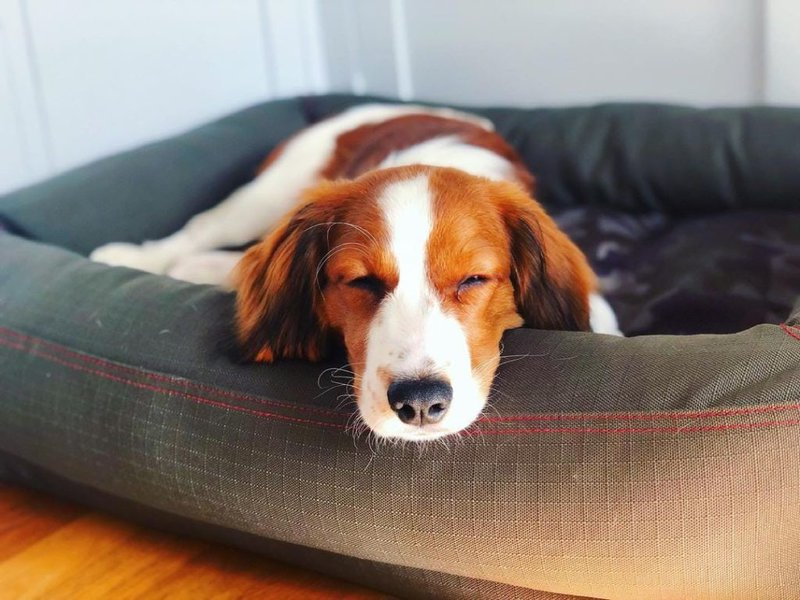
What Would Cause A Puppy To Pee In Their Sleep?
A puppy below the age of 16 weeks can hold its pee for 2 hours. As it ages, say, 16 weeks, it can hold its pee for about 4 hours. By 6 months of age, the puppy can go as far as 6 to 7 hours. However, if you do notice that your puppy seems to be having trouble holding its urine, there may be a reason for you to worry about it.
Apart from underdeveloped bladder muscles, there are medical reasons why your puppy pees while sleeping. These are urinary tract infection, kidney disease, spinal cord disease, ectopic ureter, and urachal remnants.
Urinary Tract Infection (UTI)
UTI can happen at any age for both sexes, but it appears to occur more often among female dogs. This is because of the size of the female urethra, which is shorter and wider, making it easier for bacteria to settle in and develop.
A puppy with a urinary tract infection will find it difficult to hold its urine due to pain. UTI will also cause a puppy to leak urine even after you have taken it out for a bathroom break.
Kidney Disease
Acute kidney failure results in the slowing down of kidney functions. One of the causes of kidney failure is the puppy’s accidental ingestion of antifreeze and pain medications for humans. The common symptom of kidney disease is increased urination.
A puppy may have to undergo dialysis to excrete the toxins from its blood to address the problem. Without emergency treatment, acute kidney failure could result in death among puppies.
Spinal Cord Disease
A spinal problem, like Intervertebral Disc Disease (IVDD), may also lead to a puppy’s inability to control its urine flow. If you suspect that your puppy has IVDD, have it checked immediately so the necessary treatments, such as proper medication and undergoing physiotherapy, would be conducted.
Ectopic Ureter
Some puppies may have birth defects that cause them to pee while sleeping and one of those is the ectopic ureter. In this case, the urine flows down from the kidneys without passing through or collecting at the bladder. Though uncommon, this disease is usually diagnosed at puppyhood.
Urachal Remnants
This is one of the most common bladder problems among puppies. This happens when the urachus fails to close at birth resulting in the inability to control the passage of urine. Puppies with this condition are also prone to urinary tract infections.
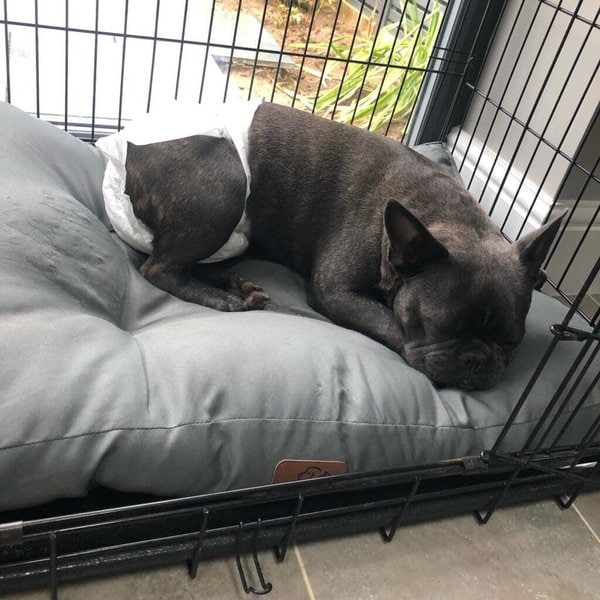
What Age Do Puppies Stop Peeing In Their Sleep?
Not all puppies are the same. Ideally, puppies aged 4 to 6 months should be able to hold their urine at night time.
Occasional accidents may happen, but that’s normal at that young age, and puppies are still unable to hold their urine the way adult dogs can. Their bladders are still growing, and they are learning the signals of needing to go to the bathroom.
It’s another story if your pup continues to pee every night while sleeping, even if there are no underlying medical conditions. In this case, you may want to relook at your potty training program.
For all you know, you may be committing a mistake or two somewhere, which explains why your puppy’s peeing behavior is in its sleep.
Here are some common potty training mistakes; Giving your pup too much freedom, delaying treats, using potty pads, and not sticking to a schedule.
Too Much Freedom
It’s a relief to see your puppy learn where the right place to pee is. After a couple of days of not having any mistakes, it’s quite common among fur parents to monitor less and allow their dogs to roam around the house freely. This relaxation may lead to regression and cause accidents, like peeing in a sleeping area.
Our tip for you is to continue supervising and wait for at least an accident-free month before you ease up and stop your supervision eventually.
Delaying Treats
A lot of parents understand the importance of giving rewards when their puppies pee in the right place. Unfortunately, there are some fur parents who reward training treats too late or are too stingy.
Our tip for you is not to delay your puppy’s reward, lest it won’t be able to associate good behavior with positive reinforcement. Plus, of course, you’ve got nothing to lose if you’d be more generous with treats.
Using Pee Pads
We do not recommend that you use pee training pads because these will only prolong the potty training process. It may seem advantageous to have a designated potty spot inside your home, but this only teaches your puppy that it is perfectly fine to pee inside the house, including its sleeping area.
Keep in mind that your goal is to train your pup to only pee outside the house. If no one’s home to take the pup out, it’s best to use a litter box with a material that mimics the grass.
Not Sticking To A Schedule
Dogs are creatures of habit. Learning through association is the key. That said, if you fail to follow a schedule, then do not expect your puppy to pee at the right place.
It also pays to be a keen observer, and your puppy will show signs that it is about to pee. It can be sniffing around and squatting. So, if you see these signs, take your pooch out immediately. This will teach your pup not to pee in its bedroom.
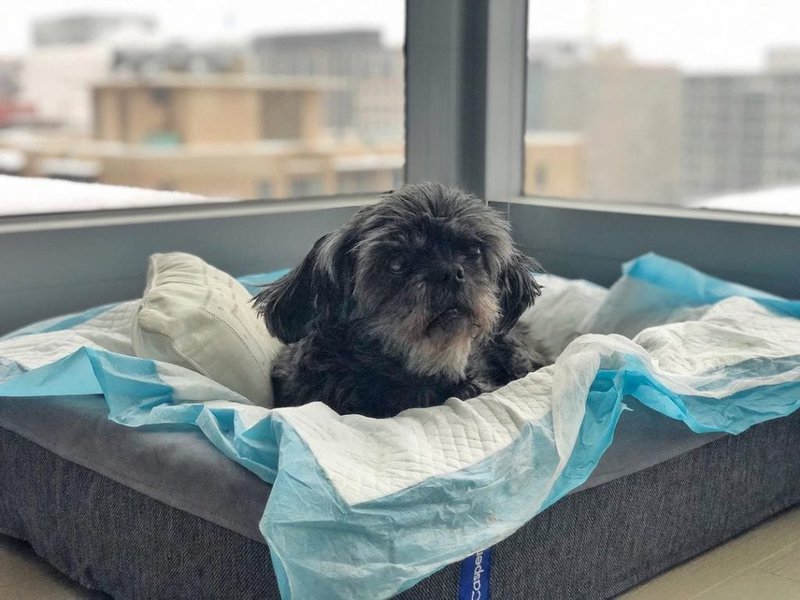
Should You Wake Up A Sleeping Puppy To Pee?
It depends on the age of the puppy. Generally speaking, the younger your puppy is, the more you need to wake it up at night to go to the bathroom. Just like human infants, potty training your pup means less sleep and more effort on your part.
Once your puppy has reached 4 to 6 months of age, it should be able to hold its pee longer. Until then, you have to wake up your puppy in the middle of every night to pee.
For the first few weeks, you may have to wake up twice throughout the night, but as your fur baby grows older, so too will the bladder be able to hold the urine.
In the end, your nightly efforts would be rewarded by having a dog who knows to do its business outside the house.
So, how do you stop your fur baby from peeing at night? Scheduled feeding time, take it out before bedtime, and set the alarm.
Scheduled Feeding Time
We suggest that you serve dinner for 4 hours and pull out its water bowl 2 hours before bedtime. No worries because this practice will not dehydrate your fur baby. If you allow it to drink water close to its bedtime, you only fill up its bladder, and it will likely pee in its sleep.
Take It Out For Potty Before Bedtime
Even if your fur baby did not drink water for a couple of hours before bedtime, it does not mean that it has an empty bladder. Give your puppy the last chance to pee before going to sleep for a more comfortable rest at night.
Set The Alarm
As we’ve said a while ago, you have to make an effort to wake up and allow your fur baby to relieve itself in the middle of the night.
For younger pups, say, 7 to 9 weeks old, you have to set the alarm 2 hours after it goes to sleep. As it gets a bit older, from 9 to 14 weeks, you may increase the interval to every 3 hours and then for puppies 14 weeks and up, wake it up every 4 hours to pee.
But, of course, not all puppies are the same. You may find that your fur baby may need to pee less or more frequently than the suggested schedule we gave you. The main goal is to wake your pup before it pees while sleeping.
Before you know it, you’ll be down to waking it up in the middle of every night, and then eventually, your puppy will sleep through the night without peeing in its bed.
